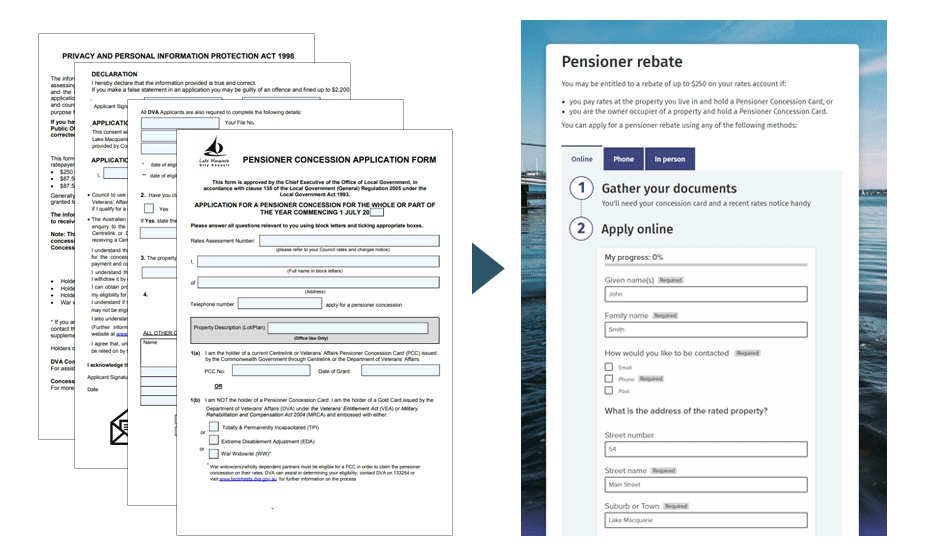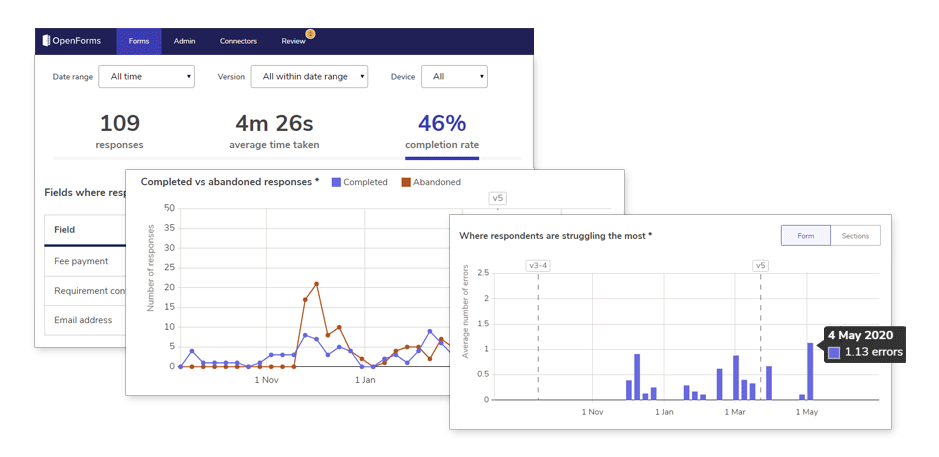Digital transformation is a journey, not a destination
Setting out to transform your digital services experience can often feel overwhelming.
Too often, it’s thought of as one big project, one large boulder, one heavy lift. Anyone else already feeling tired?
It’s this project-based mindset that can sabotage the opportunity for continuous iteration from the outset. The pressure to do it all and get it right the first time is not only impractical, it’s also inefficient. There is a reason Creighton Abrams told us to eat the elephant one bite at a time.
More cities are taking a product-based approach to transformation – a series of iterative, data-driven steps that produce both quick wins and valuable insights that lead to better customer and staff outcomes.
Launch early, lead with data
When Lake Macquarie City Council embarked on its ‘Community Portal’ journey, the City chose to implement a beta website – an uncommon approach for local governments that is now gaining momentum among digital transformation leaders.
This strategy allowed the Council to initially focus on its “top nine” services, as determined by traffic to the existing website and interactions at the Customer Service Centre.
“A full website launch would require a person’s or department’s attention for a couple of months, making it hard to maintain attention and enthusiasm. By launching sooner and then refining, the beta site helped us avoid project stalls, and planted the notion of iteration in people’s minds,” said Tom Eather, Applications and Development Coordinator with Lake Macquarie. “Starting with a beta site mitigated a lot of risks, and ultimately, led to a better mindset across the organization.”
Since launch, the Beta site has made more than 100 self-service options available to customers. Mobile device accessibility has greatly increased customer engagement and generated measurable time – and cost – savings for both residents and the Council.
On average, a single online form saves respondents 72 minutes and staff 20 minutes in contrast to in-person interactions. This has translated to more than $50K cost savings, thus far, across all online forms implemented by the Council.

Empower people with the right capabilities
Lake Macquarie leaders knew simply repackaging current website content and forms in a new visual wrapper would not solve the underlying issues of an ineffective customer journey. Hiring external consultants to manage the digital services transformation was also not scalable or feasible. So the Council took strategic steps to create a sustainable foundation built for growth and continuous impact – and the first step started with engaging its people.
The project team, which included staff from the Council’s Customer Experience, Communications and IT teams, worked closely with stakeholders across the Council throughout the project. With help from the OpenCities Digital Services Academy (DSA), stakeholders learnt how to review existing customer journeys and internal processes, and thoughtfully transition services from downloadable PDF forms to interactive online forms that put customers at the center.
“The DSA created a mental shift for subject matter experts. It was powerful not only immediately, but ongoing. With 15 different departments, we’d need to tell our story 15 times. Now we have a digital advocate in each department that knows what to do—someone the rest of the staff can turn to for assistance,” said Eather.
Iterate, then iterate again
The pursuit of better digital services can’t afford a “fire and forget it” mentality. Data is the key to driving measurable results and ongoing improvement in how to best deliver not just some, but all city services. By keeping a pulse on customer experience and feedback across the entire customer journey, Lake Macquarie City Council has continued to make meaningful qualitative changes to key services.
“Our customer enquiry forms represent one of our most popular online services. Using OpenForms Insights, I was able to sit with the Customer Service team and quickly identify pain points, errors and drop-offs within those forms,” said Ali Farzand, Web Systems Administrator with Lake Macquarie. “By being able to identify where people are having issues, we can make the right updates and fixes, and continuously measure improvements in performance.”
In this iterative approach, the Council has found it much easier to continuously improve their digital services and processes. “Using aggregated cost-to-serve values, the OpenCities Insights dashboard has helped us measure an estimated $50k in savings for the City,” said Farzand. And that’s only the beginning.

Tom & Ali’s Top 5 Tips for Iterative Success
- Don’t be afraid of the beta site approach. It mitigates multiple risks and allows a slow release of change to your customers.
- Promote a culture of self-awareness and ownership at a department level in your efforts to tailor the customer experience.
- Make the business responsible for content and forms but enable a flexible and reactive delivery process.
- The product is the way you “get there.” Without a good team to direct it, you won’t be going anywhere.
- Processes will be one of your biggest hurdles to overcome. Make sure you have an adequate approach already planned for them.